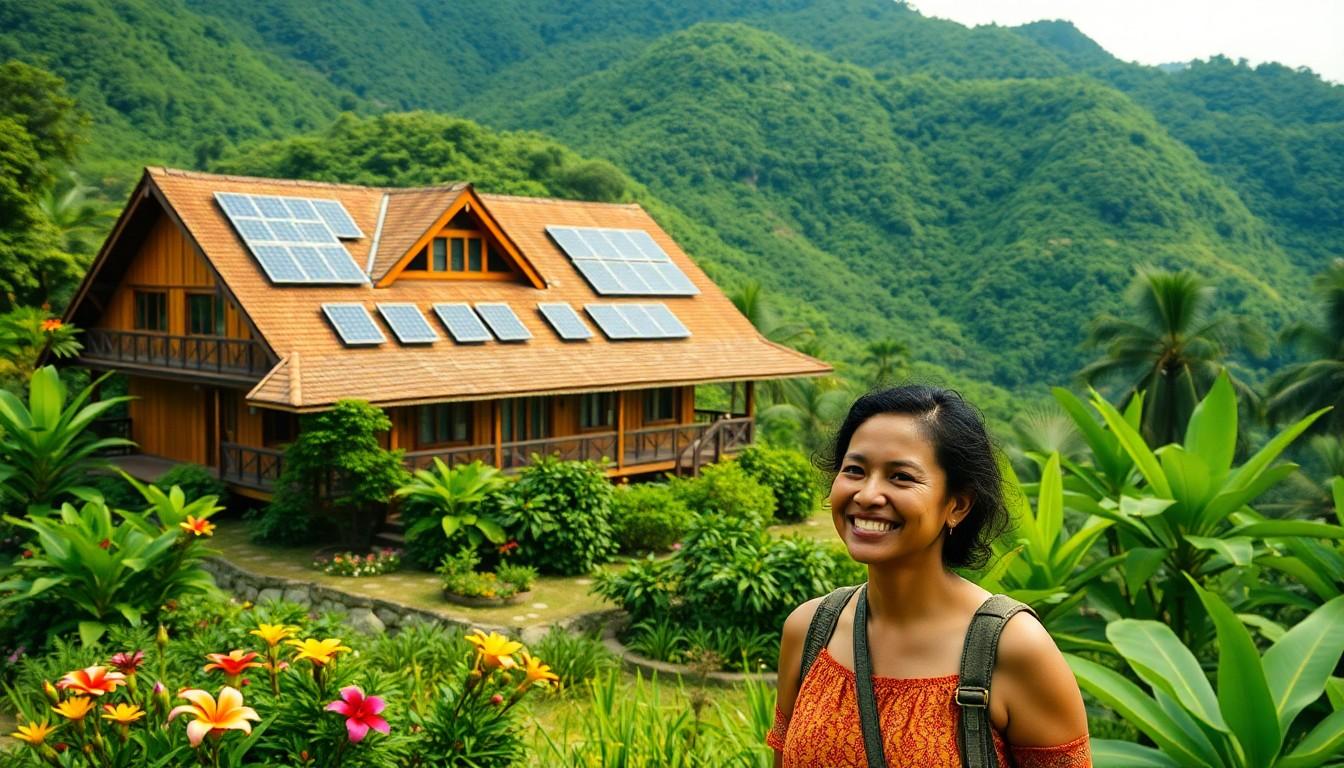
Eco Tourism Hotels: Discover Luxurious Sustainable Stays That Protect Our Planet
Imagine waking up to the gentle rustle of leaves and the sweet serenade of chirping birds, all while sipping organic coffee brewed just steps from your eco-friendly hotel. Eco tourism hotels are not just a trend; they’re a lifestyle choice that allows travelers to indulge in luxury while giving Mother Nature a big ol’ hug. Who knew saving the planet could feel so good?
Eco Tourism Hotels
Eco tourism hotels focus on sustainable practices that minimize environmental impact while offering guests a comfortable experience. These establishments promote eco-friendly initiatives, such as using renewable energy sources and implementing waste reduction strategies.
Guests can often find amenities that align with environmental values. Organic and locally sourced food is commonly served, showcasing regional flavors and supporting local farmers. Rooms may feature energy-efficient lighting and water-saving fixtures, contributing to overall conservation efforts.
Many eco tourism hotels actively engage in community projects, enhancing the local culture and economy. Supporting wildlife conservation and responsible tourism, these hotels typically encourage guests to participate in environmental activities, like guided nature walks. Travelers often enjoy educational programs that raise awareness about the region’s ecosystems.
Investing in eco-friendly materials, such as bamboo or reclaimed wood, reflects the commitment of these hotels to sustainability. Design elements often blend harmoniously with the surrounding environment, providing unique atmospheres that enhance relaxation. Wildlife-friendly landscaping further supports local habitats, providing a serene retreat for visitors.
Eco tourism hotels represent a conscientious choice for travelers looking to reduce their carbon footprint. Choosing these accommodations contributes to the preservation of natural resources and promotes a sustainable future. Making such a selection reinforces responsible travel, ensuring that adventures respect the planet.
Benefits of Staying at Eco Tourism Hotels

Staying at eco-tourism hotels offers numerous advantages that align with sustainability and community support.
Environmental Impact
Eco-tourism hotels significantly reduce their ecological footprint. These establishments utilize renewable energy sources such as solar and wind to power operations. Additionally, many implement water conservation practices, ensuring minimal waste. Guests benefit from energy-efficient appliances and eco-friendly amenities, lowering overall energy consumption. By promoting waste reduction through recycling and composting, eco-tourism hotels contribute to a healthier environment. Visitors often engage in activities that help maintain local ecosystems, fostering a deeper understanding of ecological balance.
Cultural Preservation
Staying at eco-tourism hotels supports local cultures and traditions. Many establishments collaborate with nearby communities, ensuring that tourism benefits the local economy. They often source food and materials locally, showcasing traditional cuisines and crafts. Guests experience authentic cultural interactions through workshops, guided tours, and community events. These initiatives help preserve languages, crafts, and practices that might otherwise fade. Overall, eco-tourism hotels play a vital role in safeguarding cultural heritage while enhancing travelers’ experiences.
Features of Eco Tourism Hotels
Eco-tourism hotels showcase a blend of luxury and sustainability, enriching the travel experience while preserving the environment. Various features highlight their commitment to ecological practices.
Sustainable Practices
Eco-tourism hotels extensively incorporate renewable energy sources. Many utilize solar panels, wind energy, or geothermal systems to minimize reliance on fossil fuels. Water conservation methods often include low-flow fixtures and rainwater harvesting systems. Waste management practices emphasize recycling, composting, and reducing single-use plastics. Organic farming principles guide food sourcing, ensuring that meals feature local produce and ingredients. Engage in educational programs focused on environmental responsibility and region-specific ecosystems. Supporting local artisans and communities reinforces the cultural connection while providing economic benefits to the area.
Unique Accommodations
Diverse architectural styles define eco-tourism hotels, showcasing local craftsmanship and using natural materials. Treehouses, yurts, and bungalows immerse guests in the surrounding landscape. Each accommodation often reflects regional culture, creating an authentic experience. Many feature large windows that invite natural light and scenic views, enhancing relaxation. Biophilic design elements, such as indoor gardens and natural textures, promote a sense of well-being. Guests frequently discover eco-friendly amenities, including compostable toiletries and energy-efficient cooling systems. Personalized touches, like handcrafted furniture and art, connect travelers to local communities while ensuring a unique stay.
Popular Eco Tourism Hotels Around the World
- Inkaterra Machu Picchu Pueblo Hotel, Peru
Nestled in the Andes, this hotel combines luxury with sustainability. Guests enjoy local cuisine and explore nearby ruins, all while supporting community initiatives.
- Lapa Rios Lodge, Costa Rica
This lodge sits on a private reserve, featuring bungalows that blend into the environment. Indigenous materials enhance the aesthetic, turning the experience into a natural immersion.
- The Brando, French Polynesia
Known for its commitment to the environment, the Brando uses 100% renewable energy. Guests relax in luxury villas while supporting ocean conservation projects.
- El Lodge, Spain
Located in the Sierra Nevada, El Lodge features eco-friendly building practices. Skiers can delight in organic meals after a day on the slopes.
- Soneva Fushi, Maldives
This resort emphasizes circular economy principles with waste reduction initiatives. Luxurious tented villas provide stunning views while educating guests on marine conservation.
- Treehotel, Sweden
Unique in design, each treehouse combines innovation with sustainability. Visitors enjoy treetop views and easy access to nature, enhancing their overall experience.
- Gorilla Lodge, Uganda
Set in lush jungles, the Gorilla Lodge focuses on wildlife preservation. Accommodations provide proximity to gorilla trekking adventures while promoting local ecosystems.
- Nimmo Bay Wilderness Resort, Canada
This resort prioritizes nature-based experiences. Activities like kayaking and hiking connect guests with the stunning landscapes surrounding them.
- Rayavadee, Thailand
Set amidst limestone cliffs, Rayavadee promotes environmental stewardship. Guests enjoy locally sourced cuisine while exploring nearby marine parks.
- Cedar Lodge, Canada
Located within a forest, Cedar Lodge uses green building designs that enhance energy efficiency. Visitors engage in eco-friendly activities that promote local wildlife.
Blend of Comfort and Environmental Stewardship
Eco-tourism hotels are more than just a place to stay; they embody a commitment to sustainability and cultural respect. By choosing these accommodations, travelers not only enjoy luxurious experiences but also contribute to the preservation of the environment and local communities.
With their focus on renewable energy, waste reduction, and organic sourcing, eco-tourism hotels set a standard for responsible travel. They create unique atmospheres that invite guests to connect with nature and engage in meaningful activities.
As more people embrace eco-friendly practices, these hotels will continue to thrive, offering a perfect blend of comfort and environmental stewardship. The journey towards sustainable travel starts with a simple choice, and eco-tourism hotels make that choice both easy and rewarding.
